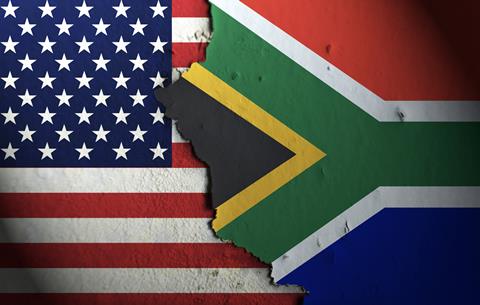Uncertainty remains as South African citrus growers gear up for conventional shipments to the US
In an atmosphere of great uncertainty, South African citrus exporters are expected to launch this season’s conventional reefer shipping programme to the US during the next week.

While they do so, their eyes are firmly focused on Washington where South African president Cyril Ramaphosa is expected to meet Donald Trump tomorrow.
This meeting is seen as vital for the future of trade relations between the two countries.
South Africa, once the darling of the US government in the time of Nelson Mandela, has not been flavour of the month recently.
It is not only the fresh produce industry that is under threat from the withdrawal of US aid programmes and sweeping tariffs on motor vehicle imports, but also the vital social programmes such as the fight against HIV and Aids.
The whole South African summer citrus programme to the US has been facing uncertainty since the American government started imposing tariffs outside the AGOA Act, which has for many years now been the catalyst for the highly successful citrus export programme.
While the first containers were already packed by mid-April, the conventional reefer programme is expected to start within days.
Since tariffs of 30 per cent were announced by the Trump administration and then paused for 90 days, South Africa has been on a 10 per cent tariff rate for all exports to the US.
South African citrus exporters are scrambling to get the maximum volume of fruit on the water before the pause in the tariffs expires.
“If unchanged by this week’s events in Washington, it will mean that all fruit packed and shipped up to the end of June will enter the USA on the 10 per cent tariff,” CGA chairman Gerrit van der Merwe recently told Fruitnet.
The 90-day deadline will however exclude most of the Western Cape’s late mandarin crop, which is an important part of the South African offer in the US.
What will happen in Washington tomorrow is uncertain – and sources say it could either go very well, or relations could disintegrate further.
Wine exporters – and table grape and stonefruit exporters – are also very concerned.
One observer said it is more or less accepted that South Africa will lose its advantages under the AGOA Act this year.
A tariff of 10 per cent will place South Africa on a par with some of its competitors such as Chile and Peru, but if it is raised to 30 per cent, South African exports will be severely affected.
“it could all be settled this week – and for a positive outcome both parties will have to compromise,” one observer said.
”The issue is much wider than trade alone and international policy issues, and perceptions about South Africa will play a major role.”
“It is not so much dealing with the new tariffs which is a problem for us,” said one exporter. “On a 10 per cent tariff we will at least be on par with our major competitors.
“It is dealing with the uncertainty at a crucial time of our season which is a major problem for the industry.”



